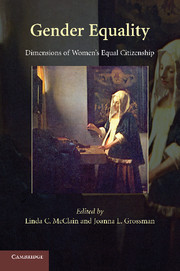Book contents
- Frontmatter
- Contents
- Contributors
- Acknowledgments
- Gender Equality
- Introduction
- PART I CONSTITUTIONAL CITIZENSHIP AND GENDER
- PART II POLITICAL CITIZENSHIP AND GENDER
- 6 Women and Antiwar Protest: Rearticulating Gender and Citizenship
- 7 Stem Cells, Disability, and Abortion: A Feminist Approach to Equal Citizenship
- 8 Representation, Discrimination, and Democracy: A Legal Assessment of Gender Quotas in Politics
- 9 Citizenship and Women's Election to Political Office: The Power of Gendered Public Policies
- PART III SOCIAL CITIZENSHIP AND GENDER
- PART IV SEXUAL AND REPRODUCTIVE CITIZENSHIP
- PART V GLOBAL CITIZENSHIP AND GENDER
- Suggested Readings
- Index
- References
7 - Stem Cells, Disability, and Abortion: A Feminist Approach to Equal Citizenship
Published online by Cambridge University Press: 05 August 2012
- Frontmatter
- Contents
- Contributors
- Acknowledgments
- Gender Equality
- Introduction
- PART I CONSTITUTIONAL CITIZENSHIP AND GENDER
- PART II POLITICAL CITIZENSHIP AND GENDER
- 6 Women and Antiwar Protest: Rearticulating Gender and Citizenship
- 7 Stem Cells, Disability, and Abortion: A Feminist Approach to Equal Citizenship
- 8 Representation, Discrimination, and Democracy: A Legal Assessment of Gender Quotas in Politics
- 9 Citizenship and Women's Election to Political Office: The Power of Gendered Public Policies
- PART III SOCIAL CITIZENSHIP AND GENDER
- PART IV SEXUAL AND REPRODUCTIVE CITIZENSHIP
- PART V GLOBAL CITIZENSHIP AND GENDER
- Suggested Readings
- Index
- References
Summary
Stem cell research is one of the most exciting scientific developments of the twenty-first century. Stem cells are unspecialized cells that generate all the more specialized cells in the body such as brain cells, muscle cells, and cells for specific organs: stem cells are the building blocks for tissues that make up the human body. Scientists have discovered that these cells can be actively coached in the laboratory to develop into a wide variety of more specialized cells such as insulin-producing islet cells that could be transplanted into diabetics to end their dependency on insulin injections, brain tissue for Alzheimer's patients, or heart tissue for damaged hearts. Stem cell research could thus lead to remedies for paralysis arising from spinal cord injuries, Parkinson's, osteoporosis, a number of autoimmune diseases and birth defects – in all, ailments that affect over 125 million people in the United States alone – which would enable many of the sick and disabled to regain control over their bodies and their lives.
Stem cells used in research can come from sources like bone marrow and cord blood from afterbirth placentas, but they can also come from tissue from aborted fetuses or from embryos created through in vitro fertilization. It is this last source that holds the greatest promise, scientists believe, and is the source of the most exciting research; embryos, only five to seven days old, offer the most undifferentiated stem cells with the greatest pluripotential, or ability to transform into a variety of different kinds of cells and circumvent immune system rejection.
- Type
- Chapter
- Information
- Gender EqualityDimensions of Women's Equal Citizenship, pp. 154 - 173Publisher: Cambridge University PressPrint publication year: 2009
References
- 1
- Cited by

